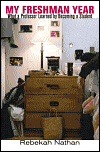The Challenge of Individualism
 I finished reading the hot-off-the-press book, My Freshman Year: What a Professor Learned by Becoming a Student, last night. Written by a fifty-something anthropologist who goes undercover at a large public university, it attempts to use the tools of ethnography to familiarize folks like me with the student culture (which I find grows ever stranger and more distant from my own experience). At the same time, I am speaking in chapel this semester on Dietrich Bonhoeffer's Life Together, an attempt to call Christians to the hard work of community. What I have quickly discovered is that the presuppositions of American college students are deeply at odds with Bonhoeffer's suggestion that Jesus "bids us come and die."
I finished reading the hot-off-the-press book, My Freshman Year: What a Professor Learned by Becoming a Student, last night. Written by a fifty-something anthropologist who goes undercover at a large public university, it attempts to use the tools of ethnography to familiarize folks like me with the student culture (which I find grows ever stranger and more distant from my own experience). At the same time, I am speaking in chapel this semester on Dietrich Bonhoeffer's Life Together, an attempt to call Christians to the hard work of community. What I have quickly discovered is that the presuppositions of American college students are deeply at odds with Bonhoeffer's suggestion that Jesus "bids us come and die."Rebekah Nathan (a pseudonym) claims that: "Community in the American university is paradoxically a private and individual decision. As Robert Putnam documents in his history of community in the United States, Bowling Alone, the private decision to participate in community life is one that individuals in recent U.S. history are making less and less. From civic and religious life to political participation and informal social connections, there is an increasing individualism in American life that is evident in our universities as well," (51-52).
Calling students (yes, even Christian students!) to such a counter-cultural perspective is no easy task. Learning that life is not "all about me" can be painful--especially for most 18-21 year olds. I worry, in particular, about students isolated or behind closed doors with their computers or video games, unengaged in college life--particularly the life of the mind and the "great ideas" which are at the forefront of a liberal arts education. In today's chapel address, Dr. Batstone used that wonderful, uniquely Marcan, pericope where it takes Jesus two tries to cure a blind man. It is one thing to see, the passage suggests; it is quite another thing to see clearly. My hope is that those who are blind will begin to discover that they are, indeed, so--that they need the rest of the community to help them interpret their experience. Further, I hope that those who begin to see (even if only partially) will learn to make less self-centered choices and begin to depend on God and the community in new ways. I pray that they will have both eyes and ears open so that they can hear God and discover their passions and vocation.
If Nathan is right in her assessment, it is not just materialism which dominates our lives, but our insistence on always being able to choose--even in idolatrous ways.


<< Home